

 |
 |
||||
| Home | Reviews | Extras | Forums |
|
Taisho Baseball GirlsSynopsisAfter being told flat out from her baseball-playing fiancee that women would be better off at home, Akiko Ogasawara takes that as a challenge and starts a baseball club at her school, hoping to gather a team of girls to prove him wrong. She quickly inducts cheerful 13 year-old Koume Suzukawa to join her, who quickly befriends the rich girl. However, getting the other seven members of the team proves to be more difficult than she expected. Taking place in 1925 Japan (the fourteenth year of the Taisho era), the country is going through an era of westernization, though the gender roles are still very much alive and well. Will Akiko be able to succeed in her goal? ReviewThere are many reasons to avoid an anime based around a sport. They often tend to center too heavily around the underdog team made up of ragtag outsiders who has to fight their way to the top. And in the case where said team are women, there's often a heavy dose of prejudice and sexism mixed into the equation. 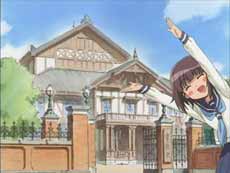 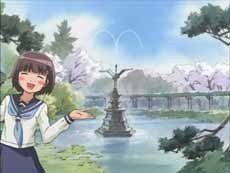 Thankfully, Taisho Baseball Girls doesn't lay too heavy a hand on either of these tropes. While the attitude that made Akiko want to start her club was clear but ignorant, the response to the girls' desire to do so was met with a large variety of emotional responses both from women and men. Pleasantly, only a minority of the men seemed to have problems with the girls starting a sports club, but it's even more surprising to find that a few women were against Akiko's desire to start a baseball team. At first you wouldn't realize this, though. Mainly because Taisho Baseball Girls doesn't take its subject matter seriously for quite a number of reasons. First, the character designs are designed to appeal to the "whee, cute girls" crowd, particularly with Koume, who is a lively, red-cheeked young girl who's all eager for the era change, if only so that she can wear a sailor fuku to school instead of that stuffy old traditional uniform of hers. Secondly, not all of the girls whom Akiko railroads for her team carries much of an interest for the sport anyway, and only agree to help her once they learn just why she wants to do this. In fact, only two of the nine girls on the team had played baseball prior to the start of the series. It also doesn't help that the most interesting part of the entire series, a cute little song number by Koume about Japan, is sung in the beginning of the series. Despite this, we enjoyed Taisho Baseball Girls. We liked that -- unlike a lot of series of this type -- the girls actually, you know, worked hard to reach their goal. And we don't mean a few episodes; we mean the whole series, taking place over a period of months. It was also nice to see the show avoid the "girls = good, boys = bad" template. With a few exceptions, like Akiko's fiancee and the principal of the boys' school, most of the guys at least acknowledge the girls' skills as they improve, if not consider them their equal in sports. Even the elementary school kids the girls practiced with, who wiped them out in their first few games, admitted their skills over time improving. Although it is Akiko who starts up the team, it's Koume who soon after becomes the main heroine of our baseball tale. She's also the only character whose family we get to see, as well as one of the few characters we see deal with her own trials and tribulations, like an arranged marriage, or, in the first episode, where she spends most of her time considering abandoning her friend's plans. 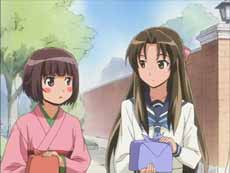  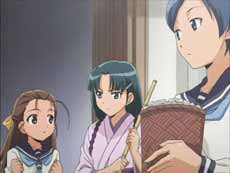 Unlike most sports series, though, the entirety of Taisho Baseball Girls isn't about her. Eventually each girl on the team gets a moment/episode to themselves. The most notable is probably Noe, the team strategist, who goes out of her way time and time again to plan for her team, even staying up late at night devising ways to overcome her teams weaknesses and play up their strengths. There's also Tamaki (voiced by Ryou Hirohashi, who also played a similarly named girl proficient in the sport she likes in Bamboo Blade), one of the very few girls on the team with previous baseball knowledge. She's hard-working and disciplined, speaking like a samurai throughout most of the series, and is one of the few girls on the team who doesn't wear a sailor fuku. A few of them are quite bland, though. We have the quarreling sisters, Shizuka and her older sister Tomoe, the latter whom is a show-off who wants to drive a home run. There's also Tamaki's kind-hearted friend,Yuki, who sometimes teases her, Tomoe's fangirl Kyouko, who only joined the team to get closer to her, and latecomer Kouchou, who can...run really fast, but didn't have the endurance needed to do well at the track team. Most of them are extras, needed to meet the prerequisite nine needed to form a full team. Their teacher is an American named Anna Garland, who supports the girls 100% and is actually quite likable. As an American, though, she's known to sprout English phrases quite often, though it's not quite as rampant as a lot of other comedies that do this. And thankfully, the show also avoids the "Americans are oversexed idiots" routine, because Anna is always fully aware of the situation the girls are in, and offers no compromises if she is to help them win this fight. The art and animation in Taisho Baseball Girls are pretty good. Considering the large cast the series has, the girls are pretty easy to differentiate for the most part (except Yuki and Kochou, who kind of look the same save their hairstyles), and the girls are quite cute. Since almost the entire show takes place in a school or in a baseball court, there is a certain lack of variety in settings, but that's to be expected (we guess) for a sports series. The opening theme is okay, though the random smatterings of English -- like "romantic strike" or "play ball" -- made us cringe each time we heard it. The ending theme, in contrast, is a fairly nice light rock anthem. The background music itself is entirely forgettable, save for a few of the orchestrated pieces, which were pretty nice. 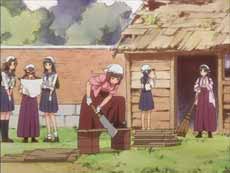 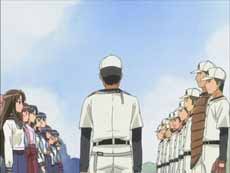 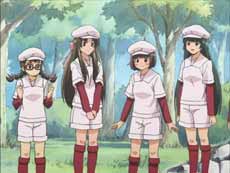 It's kind of a weird feeling to watch a show based on a sport one lacks the general interest in, and Taisho Baseball Girls actually gets as theoretical as most of them. Maybe it's just easy to get caught up in the sheer energy the girls' put into their dreams, which culminates in some pretty entertaining "late night study sessions". (It's not what it sounds like.) But while K-On! failed to encourage us to root for the girls in it, Taisho Baseball Girls succeeded in doing so without pampering the girls or sneering at the boys, and that's an important thing to acknowledge. And regardless of how you feel about the sport itself, this show is always worth spending time on. A curiously pleasant show about a sport we barely care about. — Stig Høgset and Tim Jones Recommended Audience: Mostly appropriate for children, though there are some light mature themes in the series, such as arranged marriages, sexism, and social/gender-based roles, and the expectations that often comes with them. Fanservice and violence are virtually non-existent. Version(s) Viewed: R1 DVD, Japanese with English subtitles Review Status: Full (12/12) Taisho Baseball Girls © 2009 Atsushi Kagurazaka / Tokuma Shoten / Toho Star Committee |
 |
|
| © 1996-2015 THEM Anime Reviews. All rights reserved. |